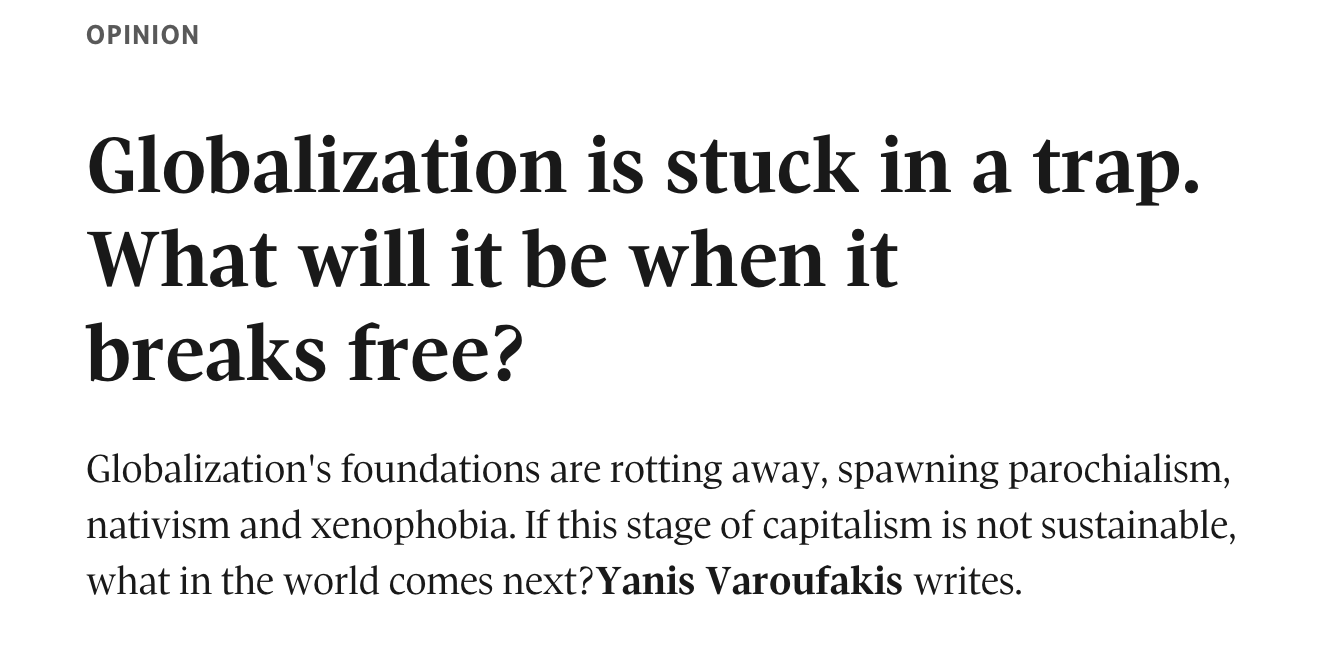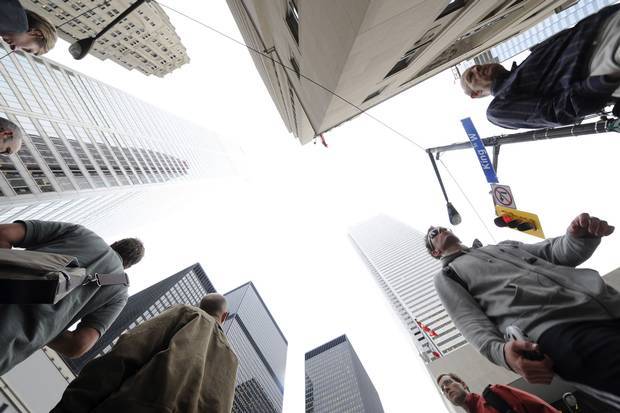Back in 1991, a left-wing friend expressed his frustration that “really existing socialism” was crumbling, with exaltations of how it had propelled the Soviet Union from the plough to Sputnik in a decade. I remember replying, under his pained and disapproving gaze: “So, what? No unsustainable system can be, ultimately, sustained.” Now that globalization is also proving unsustainable, and is in retreat, its liberal cheerleaders resemble my friend when they proffer similarly correct, yet irrelevant, exaltations of how it lifted billions from poverty. Progressives who had opposed globalization, like my left-wing friend in 1991, can take no solace from the manner in which globalization is retreating. At the
Topics:
Yanis Varoufakis considers the following as important: DiEM25, English, European New Deal, Globe & Mail, Newspapers, North America, Op-ed, The Global Minotaur: A theory of the Global Crisis
This could be interesting, too:
Chris Blattman writes The United States is not headed for civil war
Chris Blattman writes Is America on brink of civil war? Such predictions are overblown and dangerous.
Chris Blattman writes Why I think the west should support Ukraine big time, but also why we shouldn’t ignore the risks
Yanis Varoufakis writes Jamie Galbraith on DiEM-TV’s ‘Another Now’ discussing the “criminal incapacity of the elites”

 Back in 1991, a left-wing friend expressed his frustration that “really existing socialism” was crumbling, with exaltations of how it had propelled the Soviet Union from the plough to Sputnik in a decade.
Back in 1991, a left-wing friend expressed his frustration that “really existing socialism” was crumbling, with exaltations of how it had propelled the Soviet Union from the plough to Sputnik in a decade.
I remember replying, under his pained and disapproving gaze: “So, what? No unsustainable system can be, ultimately, sustained.” Now that globalization is also proving unsustainable, and is in retreat, its liberal cheerleaders resemble my friend when they proffer similarly correct, yet irrelevant, exaltations of how it lifted billions from poverty.
Progressives who had opposed globalization, like my left-wing friend in 1991, can take no solace from the manner in which globalization is retreating.
At the discursive level, neo-parochialism is now trumping globalization’s oeuvre in the United States, in Brexit Britain and elsewhere. Labour-saving technological change, meanwhile, underpins jobless deglobalization everywhere. None of these developments augur well for those who once believed in a borderless commonwealth of working people.
Humanity has been globalizing since our ancestors left Africa, the earliest economic migrants on record. Moreover, capitalism has been operating for two centuries like “heavy artillery,” in Marx and Engels’ words, using the “cheap prices of commodities” to batter “down all Chinese walls,” “constantly expanding market for its products” and replacing “the old local and national seclusion and self-sufficiency” with “intercourse in every direction, universal interdependence of nations.”
It wasn’t until the 1990s, when we noticed the unleashing of momentous forces, that we required a new term to describe the emancipation of capital from all fetters, which led to a global economy whose growth and equilibrium relied on increasingly unbalanced trade and money movements. It is this relatively recent phenomenon – globalization, we called it – that is now in crisis and in retreat.
Only an ambitious new internationalism can help reinvigorate the spirit of humanism on a planetary scale. But before arguing in favour of that antidote, it is worthwhile recounting globalization’s origins and internal contradictions.

At the Mount Washington Hotel in Bretton Woods, N.H., world leaders gathered in the Gold Room in July, 1944, to sign an agreement that created the World Bank and International Monetary Funds, pillars of what would come to be called the Bretton Woods monetary system.
In 1944, the New Deal administration in Washington understood that the only way to avoid the Great Depression’s return at war’s end was to transfer America’s surpluses to Europe (the Marshall Plan was but one example of this) and Japan, effectively recycling them to generate foreign demand for all the gleaming new products – washing machines, cars, television sets, passenger jets – that American industry would switch to from military hardware.
Thus began the project of dollarizing Europe, founding the European Union as a cartel of heavy industry, and building up Japan within the context of a global currency union based on the U.S. dollar. This would equilibrate a global system featuring fixed exchange rates, almost-constant interest rates and boring banks (operating under severe capital controls).
This dazzling design, also known as the Bretton Woods system, brought us a golden age of low unemployment and inflation, high growth and impressively diminished inequality.
Alas, by the late 1960s, it was dead in the water. Why? Because the United States lost its surpluses and slipped into a burgeoning twin deficit (trade and federal budget), rendering it no longer able to stabilize the global system. Never too slow to confront reality, Washington killed off its finest creation: On Aug. 15, 1971, then-president Richard Nixon announced the ejection of Europe and Japan from the dollar zone. Unnoticed by almost everyone, globalization was born on that summer day.
Mr. Nixon’s decision was founded on the refreshing lack of deficit phobia particular to American decision-makers. Unwilling to rein in deficits by imposing austerity (that would have done more to shrink the country’s capacity to project hegemonic power around the world than shrink its deficits), Washington stepped on the gas to boost them. Consequently, the United States functioned like a giant vacuum cleaner, sucking in massive net exports from Germany, Japan and, later, China. However, what gave that era (1980-2008) its energy and character was the manner in which the United States paid for its expanding deficits: by means of a tsunami of other people’s money (European, Japanese and Chinese net exporters’ profits) rushing into Wall Street in search of higher returns.
But for Wall Street to act as this magnet of other people’s capital, there were two prerequisites. One was Wall Street’s unshackling from New Deal-era regulations. Bank deregulation was central in this audacious reversal: From recycling Amercian surpluses, via transferring them to Europe and to Japan, the United States was now recycling the supluses of the rest of the world rushing into Wall Street, completing the loop necessary to pay for America’s deficits and keep globalization in rude health.
The second condition was the cheapening of American labour and the substitution of growing wages with escalating credit, provided via Wall Street. This cheapening of American labour was essential to helping push Wall Street’s capital returns above those of Frankfurt and Tokyo, where competitiveness was based instead on enhancements to productivity.
Through it all, neoliberalism emerged from the margins of political economics to dominate our discourse after the end of Bretton Woods. But it was nothing more than the sermon that steadied the hand of politicians repealing New Deal-era protections for workers and society at large from the motivated abuses of Wall Street bankers and predators such as Wal-Mart.
In summary, what we now call globalization was the result of a brave new financialized global recycling mechanism of immense energy and ever-increasing imbalances – with the rise of neoliberalism, wholesale bank deregulation and Wall Street’s “greed is good” culture as its mere symptoms. Before long, the Soviet Union and its satellites collapsed, with the new rulers keen for a piece of the action and the Chinese Communist Party determined to survive by staging a managed insertion of China’s workers into capitalism’s proletariat.
Financial capital’s inexorable march and two billion workers entering the global labour market ensured a stupendous redistribution of income and wealth. While billions of people were lifted from abject poverty in Asia, large swaths of Western workers were discarded, their voices drowned out by the cacophony of money-making in financialization’s epicentres.

Sept. 26, 2008: Pedestrians cross the intersection of Bay and King streets in Toronto’s financial district. In 2008, a financial crisis began to close globalization in a steel trap of its own making.
Globalization’s impasse, parochialism’s revenge
“Speculators may do no harm,” John Maynard Keynes once hypothesized, “as bubbles on a steady stream of enterprise. But the position is serious when enterprise becomes the bubble on a whirlpool of speculation.” Which is precisely what had happened by 2007: Atop the tsunami of European and Asian profits rushing into Wall Street, bankers built oversized bubbles of exotic forms of private debt that, at some point, acquired the properties of private money.
When these bubbles burst in 2008, the recycling loop sustaining globalization was broken – despite energetic money printing by central banks and the Chinese government’s breathtaking credit and investment spree. U.S. deficits, even after returning to their pre-2007 levels, could no longer stabilize globalization. The reason? Socialist largesse for the few – plus ruthless market forces for the many – damaged aggregate demand, repressed entrepreneurs’ sales expectations, restricted investment in productive jobs, diminished earnings for the many and, presto, confirmed the entrepreneurs’ pessimism. Adding more liquidity to such a mix makes not an iota of difference, as the problem is not a dearth of liquidity but a dearth of demand.
Wall Street, Wal-Mart and walled citizens – those were globalization’s symbolic foundations. Today, all three have become a drag on it. Banks are failing to maintain the capital movements that globalization used to reply upon, as total financial movements across the globe are less than a fourth of what they were in early 2007. Wal-Mart, whose ideology of cheapness symbolized the devaluation of labour and the gutting of traditional local businesses, is itself being squeezed by the Amazon model, whose ultimate effect is a further shrinking of overall spending. And the walls that were the nasty underbelly of the “global village” are now a source of political discontent, exposing the absurdity of a system that promotes the free movement of money and trucks while people remain fenced in.
Looking at the world from an Archimedean distance, globalization has been caught in a steel trap of its own making. Its crisis is due to too much money in the wrong hands. Humanity’s accumulated savings per capita are at the highest level in history. However, our investment levels (especially in the things humanity needs, such as green energy) are particularly low. In the United States, massive sums are accumulating in the accounts of companies and people with no use for them, while those without prospects or good jobs are immersed in mountains of debt. In China, savings approaching half of all income sit side by side with the largest credit bubble imaginable. Europe is even worse: There are countries with gigantic trade surpluses but nowhere to invest them domestically (Germany and the Netherlands), countries with deficits and no capacity to invest in badly needed labour and capital (Italy, Spain, Greece) and a euro zone unable to mediate between the two types of countries because it lacks the federal-like institutions that could do this.
And if these discontents were not enough, there is also the rise of the machines. By 2020, almost half the professions in Europe and North America will be susceptible to automation. Robots require a few highly paid designers and operators but may replace millions. This generates labour shortages and labour gluts in the same city at the same time. The middle class is in for another hollowing out, wage inequality is about to rise again in the richer countries, while developing countries will soon realize that having large young populations offers no respite from poverty: With robots getting smarter and cheaper, deglobalization takes over, and countries such as Nigeria, the Philippines and South Africa will bear the brunt of relocalization (especially with the evolution of 3-D printing).
Is it any wonder that parochialism, nativism and xenophobia are rearing their ugly heads everywhere? Rather than focusing on the role of Facebook, Russia or some unexplained, newfangled fear of the “foreigner,” the so-called liberal establishment (which is neither liberal nor particularly well-established, judging by recent electoral results in Europe and the United States) should look instead at globalization’s rotting foundations, which render it unsustainable.
But if globalization is no longer viable, what’s next? The answer offered by the so-called alt-right, the xenophobes and those who invest in militant parochialism is clear: Return to the bosom of the nation-state, surround yourselves with electrified fences and cut deals between the newly walled realms on the basis of national interest and relative brute strength. The fact that this nightmare is presented as a dream is yet another failure of globalization: Mr. Trump is a symptom of Barack Obama’s failure to live up to the expectations he had cultivated among the victims of globalization and its 2008 spasm.
Lest we forget, our problems are global. Like climate change, they demand local action but also a level of international co-operation not seen since Bretton Woods. Neither North America nor Europe nor China can solve them in isolation or even via trade deals. Nothing short of a new Bretton Woods system can deal with tax injustice, the dearth of good jobs, wage stagnation, public and personal debt, low investment in things we desperately need, too much spending on things that are bad for us, increasing depravity in a world awash with cash, robots that are marginalizing an increasing section of our work forces, prohibitively expensive education that the many need to compete with the robots, etc. National solutions, to be implemented under the deception of “getting our country back” and behind strengthened border fences, are bound to yield further discontent, as they enable our oligarchs-without-borders to strike trade agreements that condemn the many to a race to the bottom while securing their loot in offshore havens.
Our solutions, therefore, must be global, too. But to be so, they must undermine at once globalization and parochialism – both the right of capital to move about unimpeded and the fences that stop people and commodities from moving about the planet. In short, our solutions must be internationalist. And the goals of an International New Deal are pressing.
First, we need higher wages everywhere, supported by trade agreements and conditions that prevent the Uberization of waged labour domestically.
Tax havens are crying out for international harmonization, including a simple commitment to deny companies registered in offshore tax havens legal protection of their property rights.
We desperately need a green-energy union focusing on common environmental standards, with the active support of public investment and central banks.
We should create a New Bretton Woods system that recalibrates our financial infrastructure, with one umbrella digital currency in which all trade is denominated in a manner that curtails destabilizing trade surpluses and deficits.
And we need a universal basic dividend that would be administered by the New Bretton Woods institutions and funded by a percentage of big tech shares deposited in a world wealth fund.
The financial genie needs to be put back in its bottle, with capital controls domestically and globally to be imposed by co-ordinated action in the Americas, Europe and Asia. Money must be democratized and internationally managed in a manner that shrinks both trade deficits and surpluses. The robots must become humanity’s slaves, a feat that requires common ownership, at least partly.
All this sounds utopian. But no more so than the idea that the globalization of the 1990s can be maintained in the 21st century or replaced profitably for the majority by a revived nationalism.
Who should pursue this internationalist agenda? Progressives from Europe and North America have a duty to start the ball rolling, courtesy of our collective failure to civilize capitalism. I have no doubt that if we embark upon this path, others in Asia, Latin America, the Middle East and Africa will soon join us. At DiEM25, the Democracy in Europe Movement that I proudly co-founded, we take this duty seriously. We are determined to take this agenda, which we refer to as the European New Deal, to voters across the continent in the May, 2019, European Parliament elections. With globalization in retreat and militant parochialism on the rise, we have a moral and political duty to do so.
For the Globe & Mail site click here.


